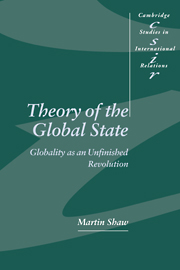Book contents
- Frontmatter
- Contents
- Preface
- 1 Introduction: globality in historical perspective
- Part I Critique
- 2 Critique of national and international relations
- 3 Intimations of globality: Hamlet without the Prince
- Part II History and agency
- Part III State
- Part IV Conclusion
- References
- Index
- CAMBRIDGE STUDIES IN INTERNATIONAL RELATIONS
2 - Critique of national and international relations
Published online by Cambridge University Press: 07 October 2009
- Frontmatter
- Contents
- Preface
- 1 Introduction: globality in historical perspective
- Part I Critique
- 2 Critique of national and international relations
- 3 Intimations of globality: Hamlet without the Prince
- Part II History and agency
- Part III State
- Part IV Conclusion
- References
- Index
- CAMBRIDGE STUDIES IN INTERNATIONAL RELATIONS
Summary
The key theoretical issue is the order of question that globality represents in our understanding of society. The debate about modernity and globality which we began to consider in the previous chapter, provides one possible avenue for answering this. Both the common understandings of globality – in terms of ecological unity and of intensified social relations due to transformations of time and space – underline its links with modernity. The continuities between previous phases of modernity and our current condition are certainly fundamental, as writers such as Giddens have emphasized. Globality seems easily conceived of as late modernity, or as postmodernity in the sense that Bauman proposed. When Albrow suggested that globality fundamentally transcends this most general condition of the social order of recent centuries, he appeared to contradict a broad sociological consensus.
The extended concept of globality that I have proposed – centred on the developing social unity of humankind – largely supports this radical case. The argument here is that while some key modern features remain central, globality brings real challenges to our understanding of modernity as a whole. It is not, of course, that concepts of human commonality as such are novel. Clearly they pre-date not just globality but modernity as well. In a certain sense, moreover, they have been central to modernity. But the modern centrality of human commonality was always understood in terms of the built-in tension between commonality and division.
- Type
- Chapter
- Information
- Theory of the Global StateGlobality as an Unfinished Revolution, pp. 25 - 66Publisher: Cambridge University PressPrint publication year: 2000



